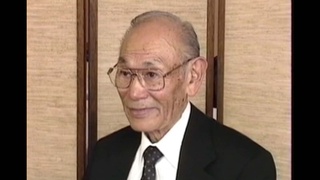Interviews
Being a Criminal Lawyer
I’ve been a criminal lawyer my whole career. So I’ve been in and out of prisons and jails and you know prisoners are my congregation. They’re the people that I’ve minister to and there will be people who are on the end of the snitches and collaborators and other people that will turn on the other inmates and the people that refuse to cooperate with it are my role models.
My dad refused to go along with some of the acts of submission that were being recommended by the citizens group against the Issei, the non-citizens—who were prohibited from being citizens—that was sort of my dad’s congregation. He ministered to them, he spoke for them, a lot of them couldn’t speak in English actually, and got marginalized in the camp along with them and I’ve always been very proud of that.
I felt like you know, it’s just like the immigrants today, we're standing up for the people that don’t have that standing and they turn into a voiceless mass that somebody’s gotta speak up for and their human rights are at stake, they are being violated on a daily basis...somebody’s gotta speak up for them. And so my brothers and sisters in the immigration law, I have great admiration for them, but if I could just speak another language, I would be doing it with them, but I can’t.
So, I think it’s that we talk about careers and lives, and yeah, I mean my career choice and what I continue to choose in that line of work, I think it’s affected by the camp, being Japanese-American, some of the things that I’m able to be proud of is that we had gone through some some other experiences that are even comparable that give us a perspective.
Date: July 14, 2020
Location: California, US
Interviewer: Matthew Saito
Contributed by: Watase Media Arts Center, Japanese American National Museum; Japanese American Bar Association
Explore More Videos

Prevailing Within the System
(1923–2006) Community activist. Co-founded the Manzanar Committee

Meeting Japanese Americans from the mainland in MIS
(1923-2011) Lawyer, MIS veteran, founder of Francis and Sarah Sogi Foundation

Fighting For What’s Right
(1923–2006) Community activist. Co-founded the Manzanar Committee

Awareness of concentration camps as a Japanese American
(1923-2011) Lawyer, MIS veteran, founder of Francis and Sarah Sogi Foundation

Manhunt
(1919 - 2005) Challenged the constitutionality of Executive Order 9066.

The Final Verdict
(1919 - 2005) Challenged the constitutionality of Executive Order 9066.



Feeling angry upon reading of Supreme Court case, 'Korematsu v. United States'
(b. 1955) Lawyer

Is 'Korematsu v. United States' still a threat to American civil liberties?
(b. 1955) Lawyer


Role of the redress movement in helping Nisei to open up about their wartime experiences
(b. 1946) Lawyer

Search of family home by the FBI following the bombing of Pearl Harbor
(1937 - 2021) Teacher


Not recognizing father after reunion at Crystal City, Texas
(1937 - 2021) Teacher
